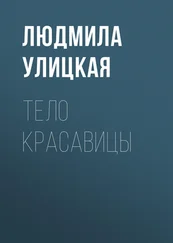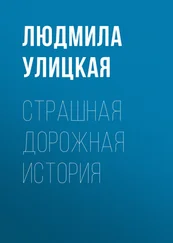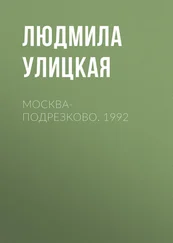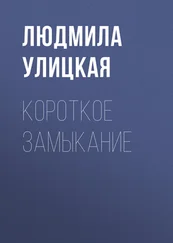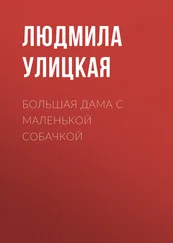Alik was steady and good-humored, and didn’t ask awkward questions. Their conversation centered on emigrating. They had already arranged for an invitation from Israel, but although Masha contributed to these conversations, their emigration seemed unreal to her.
When Nike went off to Tbilisi in September, Masha was devastated by her absence. She tried ringing through but found it impossible to catch her at the hotel. She wasn’t able to contact her through Nina either.
In September, Butonov finished his renovating and went to stay with his wife in Khamovniki, but the redecorated house in Rastorguevo drew him back and he would sleep there two or three times a week. Sometimes he came to collect Masha, and they drove there together. One time they even went to gather mushrooms in Rastorguevo, found nothing, got soaked to the skin, then dried their belongings by the stove and one of Masha’s stockings caught fire; and this too was a little event in their life, like the cut finger, or a scratch or a bruise Masha suffered in the course of their amorous endeavors. Whether Butonov’s house was inimical to her or whether she brought out a tendency to sexual horseplay in Butonov himself, she had not a few of these little injuries, and was even rather proud of her souvenirs of passion spent.
When Nike finally came back from Tbilisi, Masha related all these trivia to her at great length, and finally mentioned in passing that their invitation from Israel had arrived. Nike was amazed at how Masha’s head had been turned, when she couldn’t see that receiving the invitation was what really mattered.
Emigrating meant parting from your family, perhaps forever, yet here was Masha showing off her bruises and reading her poems. This time Nike too had something to relate. She was getting very deeply involved in her new affair and had decided this would be a good moment to dot Butonov’s i .
She waited a whole week, like Penelope, for her Vakhtang to come from Tbilisi to Mosfilm for his auditions, but his arrival kept being postponed, and in order not to get out of condition Nike took herself around to see Butonov. As Masha constantly reported on her own movements, there was no problem in finding a suitable moment.
Butonov was very pleased to see Nike. He wanted to show her the newly redecorated half of the house. Nike was, after all, his personal interior designer. He now loved the idea of the exposed beams, but Nike was horrified to see that the logs had been drenched with varnish. She comically berated him at length and ordered him to clean the varnish off with solvent. She moved the furniture around and pointed out to him what needed repairing and what was best left alone. She had lived many years with a stepfather who was a cabinetmaker and with her talents had rapidly understood the ins and outs of his profession. She promised to bring Butonov some colored glass to replace what was missing in the buffet and to sew curtains for him in the theater workshop.
At some point in the proceedings Nike’s head scarf slipped off and insinuated itself snakelike between the sheet and the mattress. Nike couldn’t find it, although she looked for it for a long time in the morning. The scarf was one she had made herself when she was learning batik at college.
When Masha, barely through the door, crumpling the scarf in her hands, fired the question straight at her as to whether it was true, Nike sternly cut her short: “Well, what did Butonov say?”
“That you and he have . . . for ages, since the Crimea. It can’t be true, it can’t. I told him it was impossible.”
“And what did he say?” Nike asked, keeping up.
“He said, ‘Accept it as fact.’ ” Masha was still screwing up Nike’s scarf, the embodiment of the fact.
Nike drew the scarf out of her hands and threw it under the mirror. “Well, accept it!”
“I can’t, I can’t!” Masha wailed.
“Masha,” Nike suddenly softened. “It’s just how things turned out. What do you want me to do, hang myself? Don’t let’s make a tragedy out of it. God knows, it’s Les Liaisons dangereuses all over again.”
“But, Nike, my sunshine, what am I to do? You want me to just get used to it? I don’t understand myself why it hurts so. When I pulled this scarf out, I almost died.” She became flustered again. “No, no. It’s impossible.”
“What do you mean? Why is it impossible?”
“I can’t explain. It’s as if anyone can do anything with anyone. Nothing matters. It doesn’t matter who you choose. One person is just the same as another. But here, I just know, there is something unique and special, against which nothing else has any meaning. Unique.”
“My angel,” Nike stopped her. “Aren’t you just imagining that? Every case is unique, believe me. Butonov is an excellent lover, but you measure that in centimeters, minutes, hours, the level of hormones in the blood. They’re all just parameters. He has a good body, no more than that. Your Alik is a remarkable person, intelligent, talented. Butonov isn’t worthy to lick his boots, but Alik just hasn’t given you enough—”
“Shut up!” Masha screamed. “Shut up! Take your Butonov and all his centimeters. You’re welcome to him!”
She rushed out, for some reason seizing the head scarf she had just returned to Nike from the pier table.
Nike did not stop her. Let her rage. If people have idiotic delusions, you have to leave them to get rid of them. When all was said and done, Butonov had put it quite correctly: “Accept it as fact.” But then . . . to her annoyance Nike recollected Masha’s poem: “Accept too that beyond all measure, like heaven’s grace on heaven’s grace . . .” Well, go ahead and accept it. Accept it as fact.
Dear Butonov! I know that correspondence is not your forte, that of all the forms of human interaction the most important for you is tactile. Even your profession is like that—everything in the fingertips, in touching, in delicate movements. And if one stays on the superficial, the surface level, in both a literal and a metaphorical sense, then everything that is happening is perfectly proper. Touches have neither faces nor eyes, it is only receptors at work. Nike tried to explain that to me too: everything is determined by centimeters, minutes, hormone levels.
But this is just a matter of faith. I evidently belong to a different confession; what is important for me is the expression on someone’s face, their inner impulse, a turn of phrase, what they feel in their heart. And if that is not there, then we are only objects for each other to use. To tell the truth, that is what torments me most. Are there really no relationships other than those of the body? Is there really nothing between you and me other than embracing until the world disappears? Is there really no communion higher than the physical, when all sense of the distinctness of our two bodies is lost?
Nike, your lover, my more-than-sister, told me there is nothing more than centimeters, minutes, hormones. Say no. Tell me it isn’t true! Was there really nothing in what took place between us that can’t be described by parameters of one kind or another? If that is true, then you don’t exist, neither do I, neither does anybody or anything at all and we are mechanical toys and not the children of the Lord God. Here is a little poem for you, dear Butonov, and I beg you: say it isn’t true.
Play on, centaur, play on, chimera of two breeds,
burn, fire, along the boundary dividing
the human soul and its immortal needs,
the stallion, his lusts unbridled riding.
Your destiny it is to mediate, to ferry,
to ply shores which forget how close they used to be,
and heedlessly you plunge into those waters merry
Читать дальше
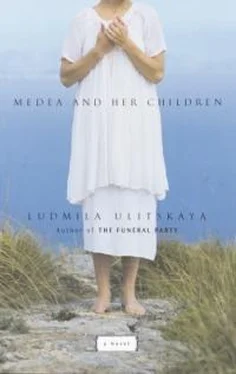
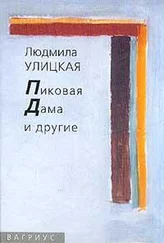
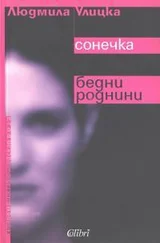

![Людмила Улицкая - Сквозная линия [litres]](/books/393468/lyudmila-ulickaya-skvoznaya-liniya-litres-thumb.webp)
